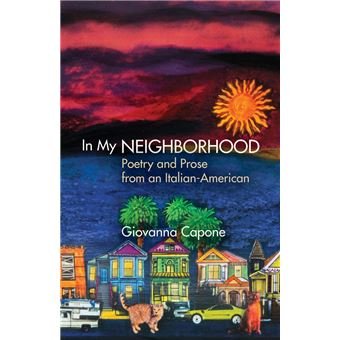In My Neighborhood
In My Neighborhood: Poetrry and Prose from an Italian-American by Giovanna Capone, Bedazzled Ink Publishing Company ($9.95)
“You are the miles I would travel the moment you say yes”
In My Neighborhood by Giovanna Capone is a book about families and their inevitable distances. Whether they are the families we are born into or the families we find as adults, distances are either resolved or created through these kinships. These are the distances that Giovanna Capone traverses as she seeks a neighborhood of greater connection.
The book is comprised of three sections. In the first part the author focuses mostly on her Italian heritage and her early years in New York, the second part is concerned with her life as an adult, and the final part consists of two works of prose offering more insights and details to subjects that were alluded to earlier in the collection. Throughout the entire book the author’s gift for narrative brings the stories of many families to life.
In “Stowaway 1924” we are told of the brothers Danielo and Demetrio living an ocean apart. On his way to the U.S. to reunite with his brother, Danielo becomes a part of another family as “the sailors fed him/ bread and beans stolen from the galley/ they sent him to the hole to shovel coal/ to keep the steam engine going.” It is in the poems about her parents and grandparents that we are introduced to the kinds of unforgettable characters that make a neighborhood vibrant.
We have her mother’s humor in “Vibrations” when confronted by a doctor: “’how do you handle your stress?’ he says./ ‘I yell,’ she answers without hesitation.” In “Vincenzo Salvatore, My Father”, we are told of her attempts to emulate the man’s “sleek Italian style.” And most memorably, in “Angela Maria, My Grandmother” we are told of a tragic accident that happened to her grandfather and the tenderness of her grandmother in the aftermath when she would “bend to pull his boots off/ rubbing his sore feet by the stove.”
In the second part the relationships are more fleeting but no less powerful. For the poet “faint sounds tingle my nerves/ in a deep place I reserved for you/ and fine-tuned, my ears listen/ for more” in “Evening in California.”
The finest moments in the book are the brief excursions into the surreal. The poem “News Flash” is a brilliant satire of American xenophobic terrors. In the poem “a giant salami struck the New York coastline/ three miles west of Coney Island.” Later in this poem “the salami managed to clog/ major arteries in the thoroughfare/ 23 pedestrians were seen gagging on gobs of fat.” This poem also captures our anxieties in the age of rapid climate change.
“Amtrak” gives us a portrait of the other American coast, “its blue serenity broken/ with oil rigs banging/ their endless demands/ into the sea.” Through the screeching rhythms and rapid imagery of this poem we share the displacement of the author as she travels far from the person she loves. Moments like these make the book an entertaining read but there were also moments when the author could have gone deeper to find a greater meaning, truth, or empathy to satisfy the desires of her readers for connection. As previously noted, the author has an incredible talent for narrative, and perhaps it is because of this that some of the poems seemed more suited to be essays or short stories than poetic works.
In the second part of the book there is a poem called “Houdini.” The poem takes place in “January, 1991/ George Bush senior declares war on Iraq/ The next day I woke up thinking about Houdini.” While these thoughts seem random at first, as the poem proceeds we realize that the poet is struggling between the need to be a part of the human family and the desire to escape from the repugnance of that family’s violence.
This is a struggle captured throughout the book, the necessity of human connection and the intrinsic pain such connection brings. Such a struggle and the distances it creates are unavoidable; it is this struggle that makes In My Neighborhood a compelling book.
Benjamin Schmitt
Benjamin Schmitt’s poetry has been published or is forthcoming in Hobart, Grist Journal, Two Thirds North, Matter, The Monarch Review, and elsewhere. His first book was published in 2013 by Kelsay Books. It is entitled The global conspiracy to get you in bed. He lives with his wife in Seattle where he teaches workshops to both children and adults.


